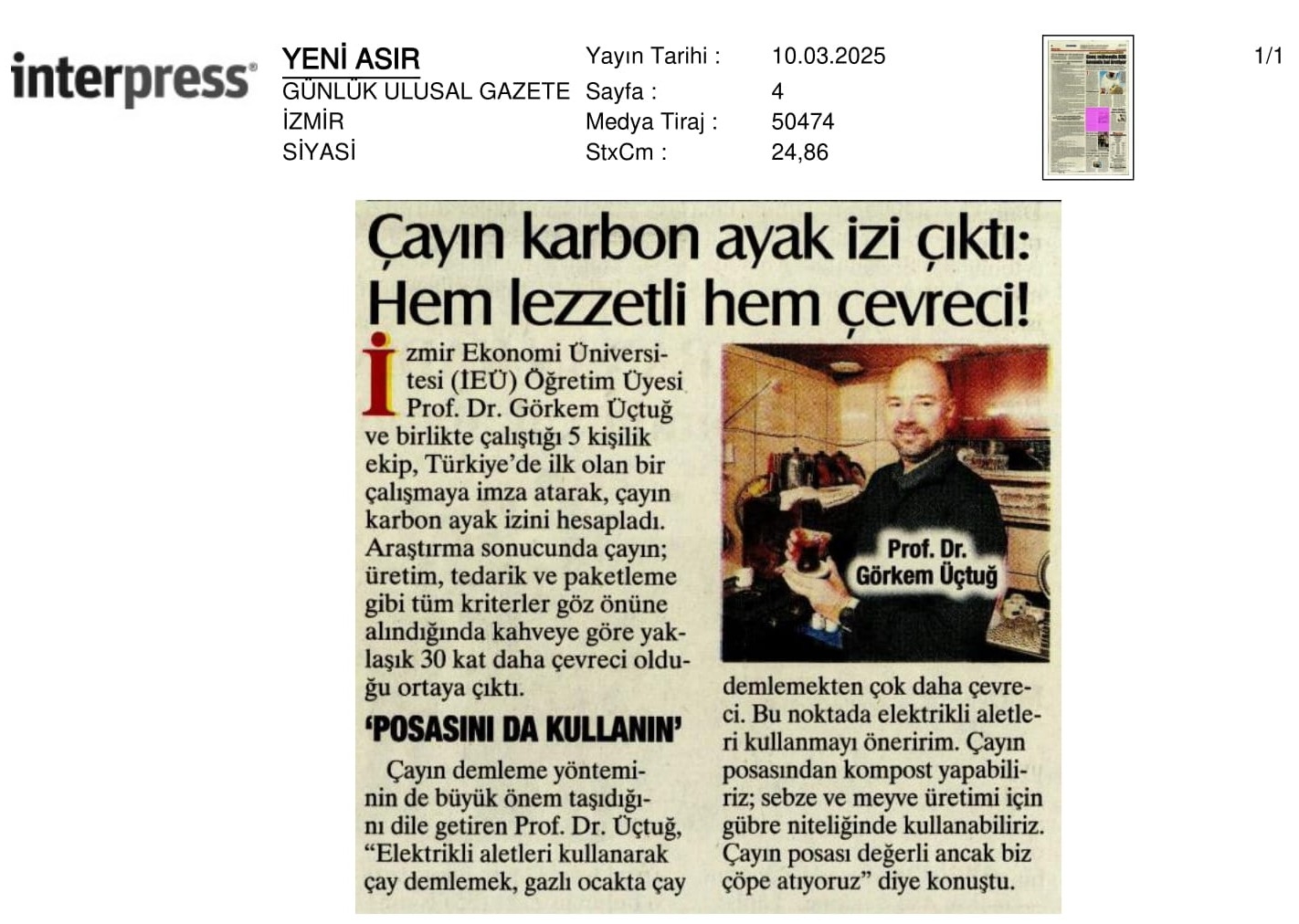The Carbon Footprint of Tea

Prof. Dr. Görkem Üçtuğ, a faculty member at Izmir University of Economics (IUE), and his team of five academics have conducted a first-of-its-kind study in Turkey by calculating the carbon footprint of tea, which is indispensable in our kitchens. The study found that, considering all factors such as production, supply, and packaging, tea is approximately 30 times more environmentally friendly than coffee and 12 times more eco-friendly than carbonated beverages. Noting that Turkey ranks first globally in per capita tea consumption, Prof. Dr. Üçtuğ stated, “Tea production does not require excessive water consumption, nor does it involve high chemical usage. In terms of environmental impact, tea is significantly more advantageous compared to carbonated drinks and coffee. By using proper brewing methods, we can further reduce the carbon footprint of tea.”
Prof. Dr. Üçtuğ, from IUE Department of Mechanical Engineering, collaborated with academics from Izmir Institute of Technology, Dokuz Eylül University, and Adana Alparslan Türkeş Science and Technology University as part of a TUBITAK project led by Prof. Dr. Volkan Ediger from Kadir Has University.
PUBLISHED IN AN INTERNATIONAL JOURNAL
Prof. Dr. Üçtuğ stated that they used the life cycle assessment method in their research, which focused on Turkey, and shared details of their study, which was published in an international scientific journal. Prof. Dr. Üçtuğ said, “We obtained data from a tea-producing company in Adana. In our analysis, we considered all aspects, including tea cultivation, transportation, packaging in factories, delivery to customers, brewing, and disposal of tea waste. There were previous research on the assessment of the carbon footprint of coffee and carbonated beverages, but ours was the first study focusing on tea. The results clearly showed that tea has a significantly lower environmental impact than coffee and carbonated beverages in Turkey. For example, a 330 ml can of a carbonated beverage has an approximate carbon footprint of 0.17 kg CO₂ equivalent. For tea, this figure is around 0.014, which is about 12 times lower. For coffee, the number rises to 0.40, meaning tea’s footprint is nearly 30 times lower than coffee. Since carbonated drinks are industrially processed, they undergo extensive manufacturing steps. Meanwhile, coffee is imported and has drying methods that contribute to its higher carbon footprint. By scientifically measuring the carbon footprint of tea in Turkey, we have proven its environmental advantages.”
“USE ELECTRIC APPLIANCES AND USE THE TEA WASTE”
Emphasizing the importance of the brewing method, Prof. Dr. Üçtuğ said, “Using electric appliances to brew tea is much more eco-friendly than brewing it on a gas stove. I recommend using electric devices whenever possible. Additionally, tea waste can be composted and used as fertilizer for vegetable and fruit production. Tea waste is valuable, yet we often discard it. These may seem like small steps, but they significantly impact the environment. If we pay attention to these factors, we can further reduce tea’s carbon footprint and minimize its environmental impact.”
Press Clippings
NEWSALL NEWS

Ruby, Rails, and HOTWIRE for Modern Web/Mobile Application Development Event Held Successfully
The Ruby, Rails, and HOTWIRE for Modern Web/Mobile Application Development event, organized by the Faculty of Engineering, Department of Software Engineering, was ...

Ruby, Rails, and HOTWIRE for Modern Web/Mobile Application Development Event Held Successfully
The Ruby, Rails, and HOTWIRE for Modern Web/Mobile Application Development event, organized by the Faculty of Engineering, Department of Software ...

TÜBİTAK 2209-B Support for FENG498 Final Project
Our students from the Department of Mechatronics Engineering at Izmir University of Economics, Ali Gül, Damla Köleli, Sude Kurt, Cem ...

TÜBİTAK 2209-B Support for Mechatronics Engineering Students
Among the projects eligible for support under the TÜBİTAK 2209-B – University Students Industry-Oriented Research Projects Support Program, the study ...

IZMIR UNIVERSITY OF ECONOMICS GÜZELBAHÇE CAMPUS
DetailsGLOBAL CAREER
As Izmir University of Economics transforms into a world-class university, it also raises successful young people with global competence.
More..CONTRIBUTION TO SCIENCE
Izmir University of Economics produces qualified knowledge and competent technologies.
More..VALUING PEOPLE
Izmir University of Economics sees producing social benefit as its reason for existence.
More..





























